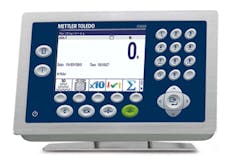In providing answers to some of the most basic of questions, maker of scales and analytical instruments, Mettler-Toledo International, is a 21st century high-technology company.
Computerization, software and the Internet drive innovation. Its business is global, with nearly $2.5 billion in annual revenues and approaching a near-even split across the Americas, Europe and Asia. And demand for the solution services it delivers to industrial-instrumentation users is growing rapidly.
At the same time, there is heritage. Mettler-Toledo company roots go back to the 19th century with the Toledo Scale and Mettler Instrument companies. Put it this way: When its forerunners were founded, weigh-scales still had two pans.
Today, global headquarters is in Urdorf, Switzerland, with U.S. headquarters in Columbus, Ohio. Managers say the business is changing. And today any strain-gauge load cell can be its own computerized weigher.
"Users today don’t want to buy a scale. They want data and information with a degree of automation that will improve a process," says Kevin McFadden, a group product leader. "Unattended weighing and self-service applications, for example, can make scales available 24×7."
As is well known, weighing applications make great use of load cells. A load cell is a transducer that is used to create an electrical signal whose magnitude is directly proportional to a measured force. Various types include hydraulic, pneumatic and strain gauge.
Today, a load cell’s on-board microprocessor means weighing is more accurate because it can continually adapt to factors such as temperature, non-linearity, hysteresis, voltage variation and sensor creep, which affect all strain-gauge load cells. Moreover, there is no junction box.
"The measure is derived at the cell, with multiple cells being networked," McFadden says. "This is more accurate than deriving the weight measure based on a signal transmitted from some distance away."
In the fourth quarter of 2014, Mettler-Toledo laboratory and industrial sales increased 6 percent. In an analyst call transcript available at website Seeking Alpha, Mettler Toledo CEO and President Olivier A. Filliol noted that the company’s service revenues in the last quarter of 2014 grew 11 percent across global regions and product lines, and said, "We are seeing the results of our investments and initiatives to globalize and harmonize our service offering."
In 2015, Mettler-Toledo projects sales growth in the range of 4 percent to 5 percent, but faces challenges that include uncertain demand in some regions, currency exchange-rate anomalies and an industrial slump in China.
Developing solutions
On-going technology and product initiatives discussed on the analyst conference call included 1) upgrades to high-end balances, 2) entry-level moisture analyzers aimed at emerging markets mainly in the food & beverage industries, 3) a new generation of check-weighers and 4) a new generation of metal detectors.
In May, the company introduced its "Industrial Compact Systems" (ICS) family of compact scales offered in aluminum or stainless steel with ingress protection up to IP69k for high-pressure and temperature washdown. Scale capacities run from 0.6 to 600 kilograms and are for industrial applications from simple weighing and counting to totalizing, check-weighing or classifying.
Firmware provides a modern, intuitive user-interface; prompts lead operators step-by-step through procedures. Profiles allow language, rights and configuration settings for flexibility and quick employee changeover.
Data interfaces connect up to four weighing platforms and integrate with IT or process-control, including multiple USBs from printers, barcode readers and keyboards. So-called "alibi-on-the-fly" functionality puts weighing data onto a USB to avoid time-consuming data downloads at shift’s end.
With rechargeable batteries and WLAN option, the scales are suited for mobile applications. Not least, available software allows creation of customer-specific print labels.
Sensor technology
While perhaps best known for its weigh scales, Mettler-Toledo’s process analytics division provides instrumentation and sensors that measure pH, dissolved and gaseous oxygen, dissolved ozone, turbidity, oxygen-reduction potential, resistivity/conductivity, total organic carbon and flow. The division includes two business units, Ingold and Thornton.
Mettler-Toledo’s recently introduced "intelligent sensor management" technology is said to feature the world’s first "learning" sensors for process analytics. Advanced algorithms allow sensors to learn process conditions within one day.
A significant issue for in-line process analytical measurement, it is said, is lack of insight into when pH sensors require maintenance or are on the brink of failure. The intelligent sensors’ diagnostic tools anticipate maintenance needs and end-of-life. More accurate pH sensor health diagnostics, readily available, leads to consistent information garnered over a sensor’s life time. PC connectivity allows data display using simple color coding, for at-a-glance probe evaluation.
Award winners
For its approach to the tunable diode laser (TDL) analyzer market, Mettler-Toledo recently received the 2014 Global Frost & Sullivan Award for competitive strategy innovation & leadership. Mettler-Toledo’s TDL series, the GPro 500, comprises four separate products for measurement of oxygen, carbon monoxide, carbon dioxide and moisture, and used for both in-situ and extractive measurement.
As is well known, in-situ measurement is increasingly preferred.
Others prefer extractive systems where a sample is extracted from the gas stream before measurement. The GPro 500 combines the laser source and analyzer in a single unit. The laser beam from the source passes down a probe and is reflected by a three-sided mirror back up the probe to the analyzer, making alignment unnecessary.
The analyzer series is available with adaptions that fit directly to the analyzer’s head and increase instrument operational flexibility. Most TDLs use quantities of purge gas to keep the analyzer optics from being coated by dust in the gas stream. Alternatively, a "robust probe" fitted with a shielded particle filter can eliminate purge gas needs. A wafer cell can enable accurate measurement in confined spaces such as 2-inch diameter pipes.
"Mettler-Toledo stands out for its ability to integrate unique features into its product line. The GPro 500 TDL series is compact and lightweight and, therefore, easy to install," says Frost & Sullivan’s Janani Balasundar. "The company collaborates to ensure compliance with regulations. For example, FM Global certification is a key requirement in petrochemical plants globally, and particularly in the United States."
Moisture analysis guide
Mettler-Toledo says the very recently launched HE73 halogen moisture analyzer gives users control over a process, and that inherent in it is a tradition for Swiss quality and no-frills, easy-to-use instrument-making. It makes moisture analysis accessible to all.
"We have years of moisture analysis expertise to draw upon, but the real challenge was to strip that back to just the basic functionality needed, at a price that everyone can afford, without compromising high standards for quality," says Claas Boerger, product manager.
As part of quality-control procedures, particularly in food & beverage, this halogen moisture analyzer delivers reliable results in just a few minutes. Even untrained operators can use it, while smaller companies can afford it and no longer need forego moisture testing.
The HE73 uses modern halogen-drying technology coupled with a weighing unit to ensure moisture accurate, repeatable results. Robust design and protective housing makes it suitable for use on the factory floor and dusty, sticky or dirty environments.
Mettler-Toledo’s "Guide to Moisture Analysis" contains a wealth of information and free online training is available.
Final words
At the end of its most recent analyst call, Mettler-Toledo President and CEO Olivier Filliol pointed again to the product innovation discussed on the previous call and mentioned above, while adding to that list the recent introduction by the company of a new line of mid-range weigh terminals for industrial environments. He reiterated, that while global challenges remain, demand for new generations of weighing and analytic solutions will continue to grow, as it has since at least the 19th century.


